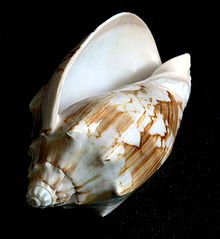Volutidae
| Volutes | |
|---|---|
 |
|
| A live individual of the Hebrew volute Voluta ebraea in its natural habitat | |
 |
|
| A shell of Cymbiola vespertilio, a large volute species | |
| Scientific classification | |
| Kingdom: | Animalia |
| Phylum: | Mollusca |
| Class: | Gastropoda |
| (unranked): | clade Caenogastropoda clade Hypsogastropoda clade Neogastropoda |
| Superfamily: | Muricoidea |
| Family: |
Volutidae Rafinesque, 1815 |
| Subfamilies | |
|
See text |
|
See text
Volutidae, common name volutes, are a taxonomic family of predatory sea snails that range in size from 9 mm to over 500 mm, marine gastropod mollusks. Most of the species have no operculum.
This family of sea snails are found mainly in tropical seas, though some species also inhabit the waters of the polar circles.
The shell of species such as Melo amphora can grow as large as 50 cm (19.7 inches) in length.
Volutes are distinguished by their distinctively marked spiral shells (to which the family name refers, voluta meaning "scroll" in Latin).
The shells have an elongated aperture in their first whorl and an inner lip characterised by a number of deep plaits. The elaborate decorations of the shells has made them a popular collectors' item, with the imperial volute (Voluta imperialis) of the Philippines being particularly prized.
According to Bail & Poppe (2001) Volutidae can be subdivided into the following Subfamilies and tribes:
Genera within the Volutidae include:
...
Wikipedia
